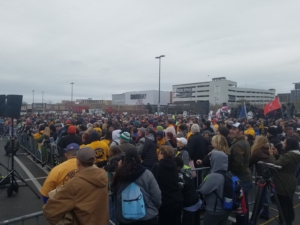Some 31,000 Stop & Shop workers in over 30 stores across Massachusetts, Rhode Island and Connecticut went on strike in early April to demand fair wages and stop proposed cuts to health care benefits and time-and-a-half pay. Organized by the United Food and Commercial Workers in the largest private sector strike in recent memory, the 11-day display of solidarity among workers, activists and community supporters resulted in a win for Stop & Shop employees, who returned to work on April 22.
As of May 1, all five local unions voted in favor of the contract, which has these stipulations:
- Higher wages for both full and part-time associates
- Retention of premium Sunday pay — a point so important that picketers regularly chanted, “I want to keep my time-and-a-half, keep my time-and-a-half!”
- Continued access to healthcare for employees and spouses
- No decrease in sick time, personal days or paid holidays for either current or future employees
- Stop & Shop will increase its contribution to pensions
This win shows that the real value of the store is created by the workers. When workers refused to show up for their shifts, the store lost millions. UFCW reported that Stop & Shop lost about $20 million per day during the strike, which would bring total losses to be over $200 million. The company itself estimated the losses to be closer to $100 million.
Geoff Applegate, the Stop & Shop worker who went viral for standing lone watch against delivery trucks attempting to cross the South Boston picket line told Liberation News, “[Before the strike] the company wasn’t even offering an equal contract to [our last contract] and when you make money like they did over the past three years… It makes no sense [for us] to lose things when the company does better. I think we not only showed our company but every company and every union what can be done if you feel like the corporation is taking advantage of the situation.”
While this victory should be celebrated, the struggle out of which it arose goes deeper than the the tension between workers and management. It’s even bigger than Stop & Shop itself. Highlighted by the wave of strikes that has been sweeping the United States in recent years is capitalism’s inability to provide basic needs to the masses of working people who generate the wealth of society. To examine the modern decay of capitalism from a practical standpoint, we can look to Stop & Shop’s parent company, Ahold Delhaize. It is a multinational conglomerate that also owns other grocery store chains, including Hannaford, Food Lion, Gran and online retailer Peapod.
Ahold Delhaize is a very profitable enterprise. According to its most recent annual report, the company made nearly $70 billion in international net sales and $2 billion in profits in 2018. It may seem baffling that a company so rich would fight tooth and nail against its employees’ efforts to negotiate a fair contract. However, in the global capitalist economy, where the first rule of business is to accumulate more capital than rivals, Stop & Shop management sees the relatively higher wages and benefits of their workers as a drain on this quest for growth. Organized workers divert revenue away from the pockets of their CEO, other executives and shareholders, who are the people that management truly represents. The capitalist profit impulse has caused a drastic increase in economic inequality since 1970, despite the vast wealth in our society. Although Ahold Delhaize’s $2 billion profit would be enough to increase the salaries of all of their low-paid workers significantly, their owners and shareholders see union contract negotiations as an opportunity to extract even more money away from workers and into their offshore, tax-avoiding bank accounts. This is the bottom line of businesses under capitalism.
Democratic Party: workers’ representatives or capitalist cronies?
To facilitate this pursuit of profit, the capitalist class uses some of their money to buy the favor of politicians. These euphemistically named “campaign contributions” go a long way in ensuring that representatives of both mainstream political parties operate in the interest of international corporate monopolies, such as Ahold Delhaize, which makes financial contributions to both Republicans and Democrats. While the Republican Party is known for its friendliness with corporations, the Democratic Party is not much better despite presenting itself as the party of the people. As noted by Robert Reich in The Guardian, rather than representing the working class, “over the last three decades [the Democratic Party] has been taken over by Washington-based fundraisers, bundlers, analysts, and pollsters who have focused instead on raising campaign money from corporate and Wall Street executives and getting votes from upper middle-class households in ‘swing’ suburbs.”

Many Democratic politicians used the strike to bolster their popular image. Most notably, 2020 Presidential Candidate Joe Biden spoke at a rally of over 1,000 people at Boston’s South Bay Stop & Shop on April 18, ostensibly to display solidarity with the workers. Biden went so far as to say it’s time to “take back this country.” It is difficult to believe that these words came from a man who spent eight years as the Vice President of an administration that cozied up to Wall Street and giant corporations throughout its term; giving banks trillions of dollars while working people suffered from the economic crash that was caused in large part by those very banks. While Biden’s flashy words at the rally sounded nice, his track record indicates that he was simply offering platitudes and empty promises to the masses to boost his momentum in the upcoming election cycle. Biden’s opportunistic approach is consistent with other Democratic Party leaders, who have demonstrated hostility toward socialism, the only economic system that can truly empower and serve working class people.
Real power lies in the hands of the people united
Despite these barriers and cooptations, the workers fought together and won. The victory has not only inspired the workers of Stop & Shop, but has also uplifted those who work at other supermarket chains. Andira Alves, long-time worker at Whole Foods in Massachusetts told Liberation News:
“Over the years, Whole Foods, especially since the Amazon takeover, has been investing less and less in its workers despite Jeff Bezos being one of the wealthiest [people] on the planet. Watching the Stop & Shop strike, I noticed we have a lot of the same grievances. Working for a company that is historically anti-union, this is the first time many of my co-workers considered collective action as a real possibility. It was really empowering seeing another grocery chain stand up to a corporation and win.”
Most working class people are in a constant struggle for a life with dignity and the means to meet their basic needs. When workers struggle alone against the alienation in which capitalism entombs them, they are buried alive by debt, fatigue and starvation. Alternatively, when workers — such as those at Stop & Shop — struggle together in solidarity, they burst forth towards true emancipation. With each victory, the strength of the laboring masses grows, as does their awareness of it. To this point Applegate said, “We showed all other unions that when they get into this situation, if the cause is just then all they have to do is be dedicated. We stuck to our guns… This can show other organized workforces and unions that if you put your all into it and fight for what is right they will cave before you do.”
After decades of union-busting and McCarthyist rhetoric, the ruling class, their corporations and their puppet politicians are witnessing the resurgence of working class consciousness and organized militancy due to the increasingly visible failings of capitalism. They should be scared because the people united will never be defeated.




